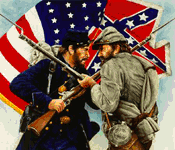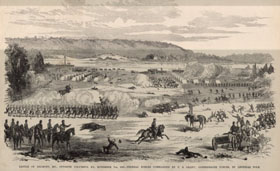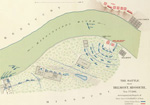 |
Civil War Battles |
|
State War Records |
| AL - AK - AZ - AR - CA - CO - CT - DE - FL - GA - HI - ID - IL - IN - IA - KS - KY - LA - MA - MD - ME - MI - MN - MS - MO - MT - NE - NV - NH - NJ - NM - NY - NC - ND - OH - OK - OR - PA - RI - SC - SD - TN - TX - UT - VT - VA - WA - WV - WI - WY |
The Battle of Belmont
November 7, 1861 in Belmont, Missouri
 |
|||||||||||||||||||||
|
On November 6, Brig. Gen. Ulysses S. Grant left Cairo, Illinois, by steamers, with an escort of 2 makeshift, timberclad gunboats, the Tyler and Lexington, to make a demonstration against Columbus, Kentucky. The next morning, Grant learned that Confederate troops had crossed the Mississippi River from Columbus to Belmont, Missouri, to intercept 2 detachments sent in pursuit of Brig. Gen. M. Jeff Thompson and, possibly, to reinforce Maj. Gen. Sterling Price's force. Grant landed his troops on the Mississippi River shore just north of the hamlet of Belmont, opposite the bluffs at Columbus, a key Confederate stronghold defended by heavy guns and a huge garrison. The landing site was out of the range of Confederate artillery at Columbus, and they started marching the mile to Belmont.
At 9:00 A.M., an engagement began. The Confederates fought stubbornly but had been pushed back to their camp at the shabby hamlet of Belmont, MO., where they finally broke and ran. Grant's troops were celebrating and looting the Confederate camp when they suddenly came under fire from Confederate cannon on the high bluff across the river at Columbus, KY. There was the main Confederate encampment, commanded by Gen. Leonidas Polk. The Union troops destroyed the Confederate supplies and equipment they found because they did not have the means to carry them off. The scattered Confederate forces reorganized and received reinforcements from Columbus.
They counterattacked the Union troops. Although hard-pressed, the Union soldiers fought their way back upriver to their transport ships, with Grant the last to get on board; then they steamed back north. Grant, who had been forced to leave behind his wounded and the captured Confederate materials, had been fortunate to escape with his command intact, but still claimed a victory. Grant did not accomplish much in this operation, but, at a time when little Union action occurred anywhere, many were heartened by any activity. 
Click to Enlarge
Though only a large raid and reconnaissance, the battle produced high casualties. Grant accomplished little, for he could easily have confirmed what he in fact already knew: the great strength of Columbus. But the battle delighted Lincoln, who desperately desired action and had grown imoatient with other slow-to-act generals, and it gave Grant and his men valuable operational and combat experience.
Afterward, officers from both sides met to decide such procedures as prisoner exchange. The light and friendly mood was characteristic of this early stage in the war. At one of the conferences, Brig. Gen. Benjamin F. Cheatham and Grant had a lively discussion of horse racing, which interested both. Cheatham playfully suggested that they have a horse race to decide the war; Grant said he wished they could, but had to decline.
